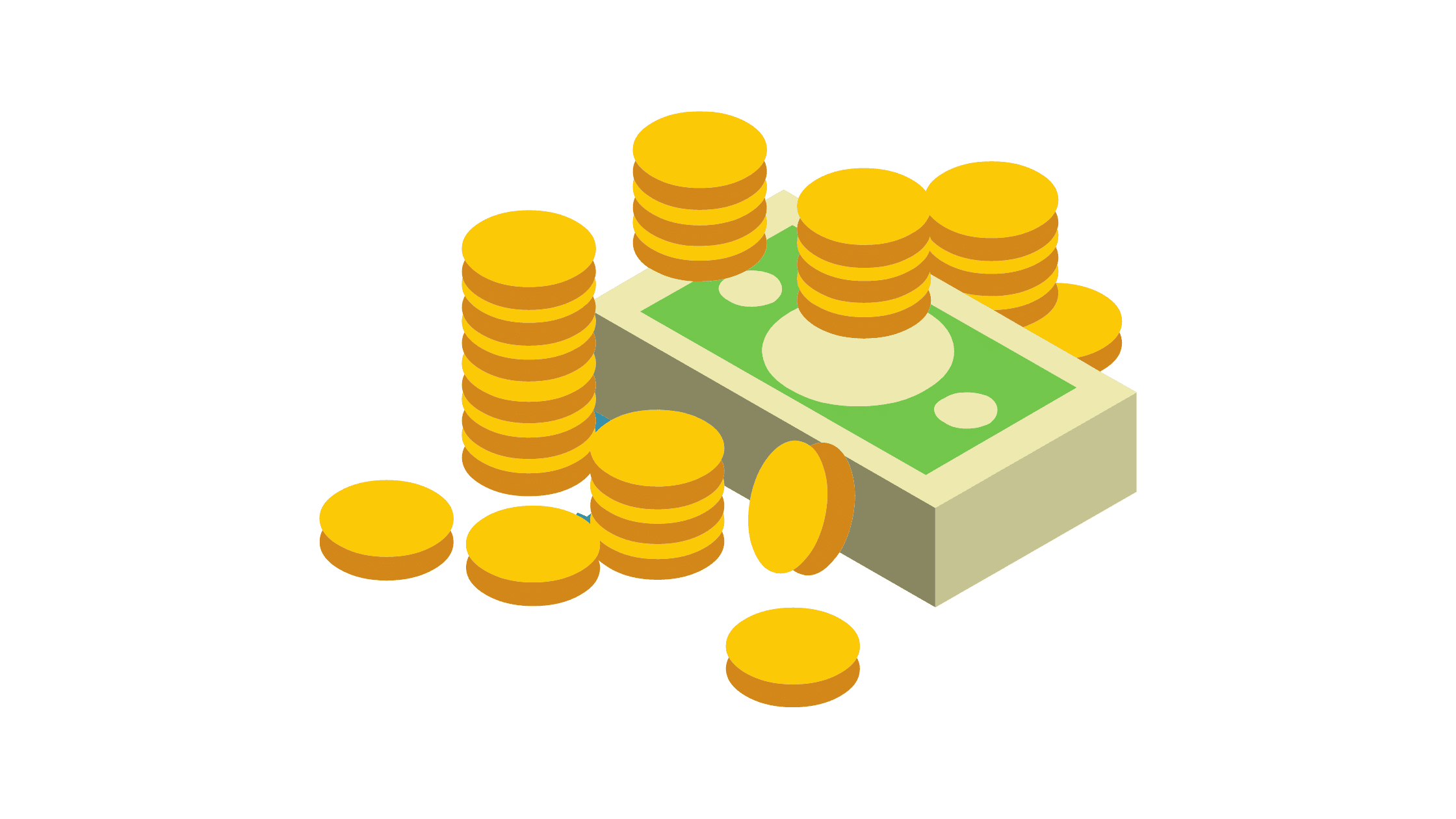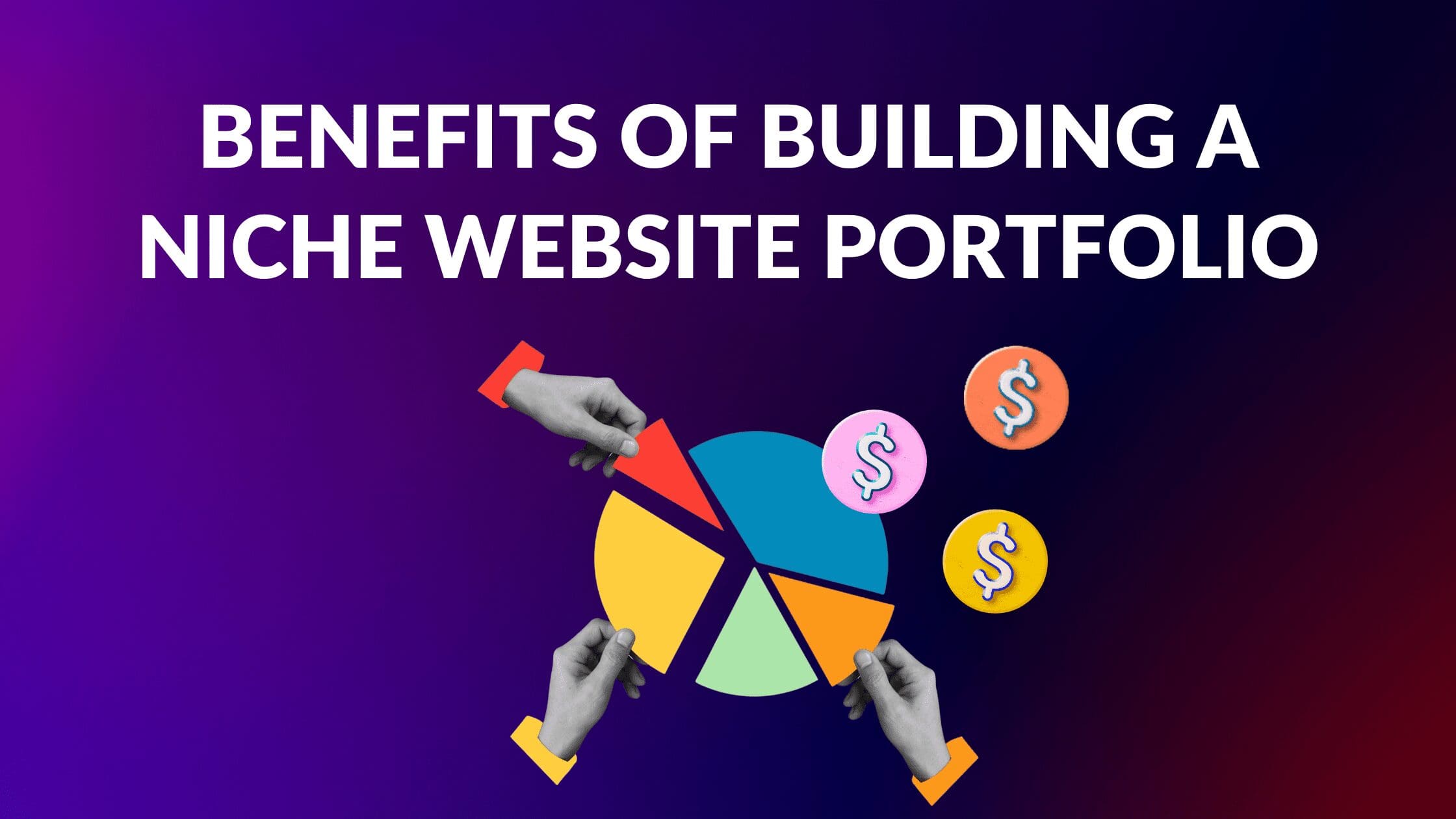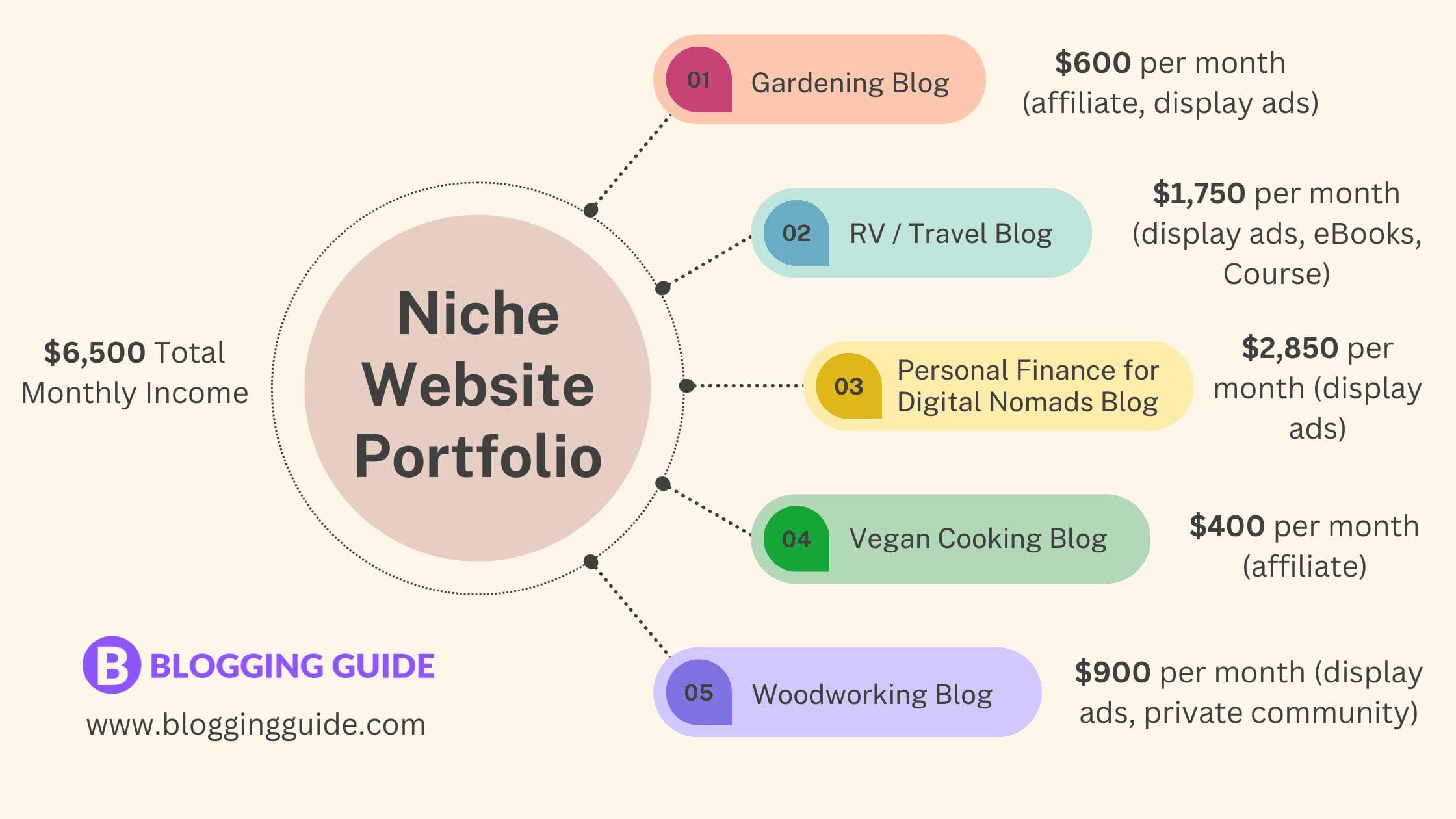Benefits of Building a Niche Website Portfolio

Written by Casey Botticello
Disclosure: Some of the links below are affiliate links, meaning that at no additional cost to you, I will receive a commission if you click through and make a purchase. Read our full affiliate disclosure here.
When it comes to building income producing niche websites, there are two main schools of thought: (1) build a single large authority site, which will be able to rank for increasingly difficult keywords over time as domain authority increases; (2) create a portfolio of niche websites, typically smaller sites, each covering a narrow topic in greater detail. But which of these strategies is better for digital entrepreneurs? This article will cover the benefits of building a niche website portfolio.
What is a Niche Website?

While most bloggers will offer varying definitions when explaining what a niche website is, for the purposes of this article, I’ll define a niche website as the following:
A niche site is a website that focuses on acquiring web traffic from a specific subset of a broader search topic. While not all niche sites are created for the sole purpose of generating income, when you hear an internet entrepreneur referencing a niche website, chances are they are referring to a site the ultimately aims to monetize its traffic. Niche sites usually make money through through display ads, affiliate marketing, lead generation, digital products, or offering membership services.
A niche website portfolio is simply a collection of multiple niche websites. While there can be similarities between each niche site in any site owner’s portfolio, many of the sites are completely unrelated in terms of topic or even monetization method.
Below is a visual representation of what a niche website portfolio, comprised of multiple income streams, might look like for the portfolio owner:
Benefits of Building a Niche Website Portfolio

1. Increased Liquidity

One of the biggest benefits of building a niche website portfolio is the increased liquidity felt by the website owner.
If you own one large website, say valued at $500K, you should be able to get a roughly similar return on your investment as someone with 5 niche sites valued at $100K each.
However, in practice, there is a very robust market of buyers of sites valued at $80K-$100K. Conversely, the market of buyers who can afford purchasing a site for $400K-$500K is relatively small.
Additionally, having the portfolio of smaller sites allows a site owner to sell a portion of their portfolio (say, one or two sites), to reap short term cash gains, while still holding on to their remaining income producing assets. The site owner with one larger site could theoretically sell equity in their site (in similar $100K chunks to the smaller sites in the niche website portfolio), but there are very few investors who are interested in buying only a piece of a website.
Especially when it comes to a larger sale, buyers are often competitors, or people who operate their own digital publishing business in an adjacent niche.
While websites with good content and strong traffic can produce income at rates that should entice silent partners willing to accept a relatively high ROI, in practice, the buyer is going to have some specific use for that site. This makes them less likely to buy a portion of a high income website, and hold it purely for cash flow, when they can modify/improve the content based on some unique set of skills that they bring to the table.
If you are 100% sure that you will never sell your site, the larger site may indeed be more appealing. But if you are not 100% sure, or want to be able to take advantage of a one of sale of your assets at a high multiple, without getting out of the blogging business altogether, the niche website portfolio will most likely provide you with the most flexibility and liquidity.
2. Diversification

While high quality content and stunning website architecture may make site owners feel invincible from being adversely affected by Google Algorithm updates, the reality is that any website can experience a sudden and dramatic loss in traffic due to a shift in Google’s algorithm.
Having multiple sites also helps diversify your investment in your blog against:
- Sudden drop in traffic from search engines;
- Bans or suspensions from major social media platform;
- Hacks, malware, or other cyber threats, which, even if resolved, will keep your site down for days if not weeks.
If you have 5 sites, you are less likely to experience any of these events across all 5 of your sites, compared to a website owner with all their eggs in one basket.
3. Ability to Experiment

When you have one high earning site, you are far less likely to try different digital marketing experiments, than if you have a portfolio of sites. If you have a niche website portfolio, you can pick your lowest earnings site and try a new strategy on this segment of traffic, without fear of harming the other 4 sites.
While experimentation is not always necessary as a blogger (in many way, successful blogging is about figuring out what does work, and then repeating these same techniques over and over at scale and with increasing efficiency), it can lead to major breakthroughs.
And if you aren’t able to try the latest marketing or SEO hacks, on a site with some level of decent traffic, it can be hard to determine if these methods are right for you.
4. Ability to Stay Hidden From Competitors

While not many new site owners realize this, as soon as your site starts to gain significant traction, it will begin to appear on more and more of the premium search analysis tools used by rival content publishers to reverse engineer your site.
To some extent this public exposure is inevitable. A site has to remain fairly small to remain off the radar of bloggers scouring Ahrefs.
But based on my own research, and discussions with other bloggers, it is clear that successful site owners would generally prefer to fly under the radar.
While most of your sites in your niche website portfolio would need to experience periods of meteoric growth in order to reach the top ad networks or get into the best affiliate programs, search analysis tools make it even easier to track sites with continued success over time.
5. Topical Authority Can be Easier to Gain than Domain Authority

When you are building a niche site, your primary goal is often to cover the entirety of your niche (or at least the most searched terms, questions, and keywords) in a relatively short amount of time. This confers some degree of topical authority to your site, when you are relating about topics related to your immediate niche.
Large sites typically require several hundred blog posts (or more) over several years to gain enough domain authority to consistently rank for a wider range of topics.
Once you reach a certain level of domain authority, ranking for any topic becomes relatively easy. however, sites with this level of authority from Google typically take at least 5 years of full time effort to build. With a smaller niche, a topic may be covered in under 100 blog posts.
6. Easier to Get into Premium Ad Networks (or Lower Thresholds)

Once you get your first site into a premium display ad network, such as Mediavine or AdThrive, it is much easier to get additional sites accepted.
In fact, the minimum sessions / pageviews required for each ad network drops by 50% or more on average once you get your first site in.
This means that you are able to onboard additional sites months if not years earlier, at a much higher RPM.
7. Scalability / Efficiency of Creating Additional Websites

When you are building a niche website portfolio, you can take advantage of the fact that you are not building a website for the first time. There are several basic processes which can be scaled much more easily, for each additional website you create:
Writers. One of the hardest parts of publishing large amounts of content (regardless of how many blogs its distributed across) is finding good writers. If you have managed to find good writers to outsource some portion of your content needs, chances are you can use these same writers across multiple topics. This can be a major competitive advantage to other smaller niche sites that you will be competing against (as they have most likely not found high quality/low cost writers, yet).
Website Infrastructure. Once you’ve built your first website, there is little point in reinventing the wheel when it comes to website design. Files that may have taken you months to create your first time around can be duplicated and modified for new websites, just minutes. In fact, some WordPress themes have unlimited licenses, allowing you to use them across as many sites as you have. This is true for popular WordPress Themes like Divi.
Tools. Once you have multiple blogs, you’ll also be able to take advantage of other resources you have already paid for, a little to no marginal cost. These include keyword research tools, website hosting, plugins, custom page templates, email marketing, and SEO tools, to name a few.
8. Allows for Multiple Interests / More Variety in Your Writing

If you are writing a significant portion of the content for your websites, it can be nice to have multiple topics to focus on.
If you have a single larger site, you may get burned out writing about the same topic all the time.
If you have a niche website portfolio, you can choose which website you want to add content to each time you sit down to write.
Plus, if you have an idea for a new site (which is a constant occurrence as a blogger) you have the freedom to explore new topics or take advantage of easy to rank keywords that you stumble across during your research (that would not make sense to post on your single authority site).
9. Multiple Monetization Models Possible

If you have a single large site, chances are that you rely on one or maybe two primary income streams from that site. Other systems of monetization may be possible, but are just not practical given how much time they would take up implementing.
Conversely, with a portfolio of niche websites, you can choose unique monetization models for each topic. If a site is product based you can make it heavily based on affiliate revenue. If a site gets traffic from a specific demographic that appeals to advertisers, you can use display ads. If you are building a brand or community, you can sell merchandise or build a paid membership community.
Conclusion
While not a perfect model, building a niche website portfolio offers writers and investors a solid chance at building a sustainable and long-term business. While there are many benefits of building a niche website portfolio, it is definitely not the only way to make money as a blogger. So consider your time, money to invest, interests, and level of writing experience before starting your first website.




